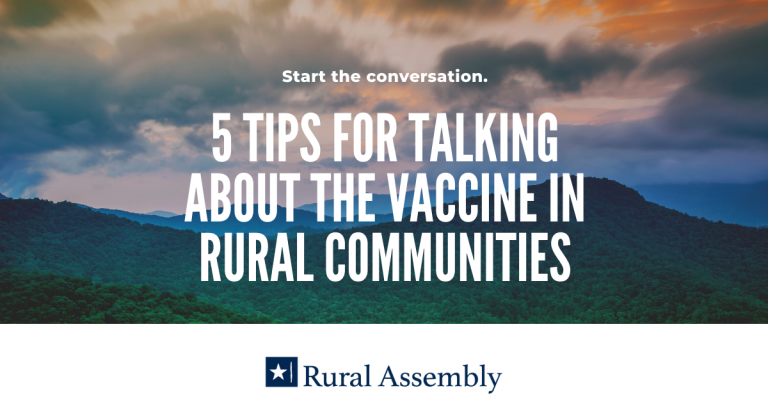Five Ways to Talk About the Vaccine for Rural Communities

By Dani Pérez
Covid cases are on the rise in rural communities across the country for the second week in a row. The Delta variant is more contagious, and experts warn that those who remain unvaccinated put themselves and their communities at an increased risk of becoming ill or hospitalized.
Rural leaders and engaged citizens have taken innovative steps to support their communities and open up conversations about the vaccine. Now, says Dr. Anthony Fauci told CBS News this morning, it’s up to citizens to reach those who still need to be vaccinated. “You’ve got to go one-on-one,” Fauci told CBS’s Gayle King.
We recognize that starting these conversations is not always easy.
If you are a rural leader, concerned community member, or just feel unsure about how to navigate this topic, we’ve culled five quick tips below, along with suggestions on how to practice these tips within a conversation.
(Adapted from the National Rural Health Association’s “COVID-19 Vaccine Talking Points for Rural Leaders and the Ad Council’s “Rural Resource Toolkit: COVID-19 Vaccines.” Both of these tools are grounded on research concerning rural communities’ specific needs).
1. Centering community values.
Try: “We’ve always pulled together for the benefit of our community… Let’s show the rest of the country how we take care of our own.”
It might be helpful to center our conversation on values that we share as members of the same community. Together, we are looking out for the protection and wellbeing of our neighbors, just as we did long before the pandemic. And as Covid cases begin to increase, the need to protect our communities is increasingly pertinent.
2. Acknowledge our community members’ concerns.
Try: “It’s normal to have questions and concerns about the vaccine. Let’s talk about them.”
Conversations about the Covid-19 vaccine bring up concerns for all of us. Recognizing our community members concerns, rather than dismissing them, can help us approach each other as equals. Additionally, this can help us understand where our community members are coming from.
3. Making ourselves available to answer questions.
Try: “What questions do you have about the Covid-19 vaccines? I’m here to answer them as best as I can, and if I don’t know the answer, we can look for it together.”
As friends, family members, and neighbors, we are resources for each other. While we may not have all the answers, we can help each other find them. This might be as simple as answering questions about our own experiences with the vaccine.
4. Providing access to facts and information.
Try: “There’s a lot of misinformation floating around, and I want to make sure you have the facts you need to make an informed decision.”
Misinformation makes it much harder to find credible sources about the Covid-19 vaccines. As community members, we can help guide each other towards reliable sources of information in order to best support each other’s decision-making process.
5. Honoring our community members’ agency.
Try: “You may feel that you don’t need to vaccinate—and that’s absolutely your choice.”
We want to make sure that our community members feel like they are active agents in their decision to get vaccinated. As a result, we want our community members to know that we are supporting them as they make their decision, instead of feeling like we are making a decision for them. We can accomplish this by using language that affirms our neighbors’ agency.
Of course, this list is far from exhaustive. If you would like to learn more about how to talk about the Covid-19 vaccines with our rural community members, we recommend reading through the complete guides:
“COVID-19 Vaccine Talking Points for Rural Leaders” by the National Rural Health Association
“Rural Resource Toolkit: COVID-19 Vaccines” by the Ad Council
Additionally, if you would prefer to open up these conversations in a different way, the National Rural Health Association (NRHA) has made an op-ed template for anyone who wants to address Covid-19 vaccine hesitancy through their local newspaper.
Want to receive advocacy news in your inbox every week? Subscribe to our new Rural Advocacy email.







